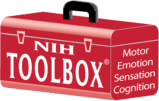Emotion
Emotion refers to any strong feelings, such as joy, sorrow, or fear. It is an affective state of consciousness in which one of these feelings is experienced, as distinguished from cognitive and volitional states of consciousness. Emotions can be positive or negative and distressing.
The NIH Toolbox Emotion tests include four major domains: Psychological Well-Being, Stress and Self-Efficacy, Social Relationships and Negative Affect.
The NIH Toolbox Emotion Battery, recommended for ages 8+, consists of tests of Positive Affect, General Life Satisfaction, Emotional Support, Friendship, Loneliness, Perceived Rejection, Perceived Hostility and Self-Efficacy. For ages 13+, the battery also includes a measure of Perceived Stress. For ages 18+, the battery also includes tests of Meaning and Purpose, Instrumental Support, Sadness, Perceived Stress, Fear, and Anger.
The NIH Toolbox Parent Proxy Emotion Battery, recommended for parents of children ages 3-12, includes tests of Positive Affect, General Life Satisfaction, Positive Peer Interaction, Social Withdrawal, Peer Rejection, Empathic Behaviors, Fear, Sadness, and Anger. For those with children ages 8-12, tests for Perceived Stress and Self-Efficacy are included.

